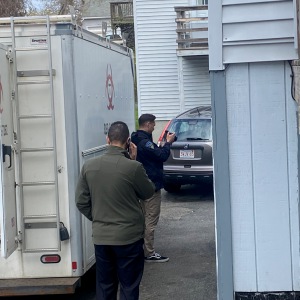‘We’re all going to struggle’: Farmers share extent of crop damage with visiting politicians
| Published: 07-12-2023 7:14 PM |
DEERFIELD — As they continue to assess the damage caused by Monday’s torrential downpours, local farmers were joined on Wednesday by legislators and state officials who got a first-hand view of the devastation across the Pioneer Valley.
In Deerfield, Jay Savage, of Savage Farm, was joined by Massachusetts Department of Agricultural Resources (MDAR) Commissioner Ashley Randle, Deputy Commissioner Winton Pitcoff, state Rep. Natalie Blais, state Sen. Jo Comerford, Selectboard Chair Carolyn Shores Ness and other area farmers to discuss the extent of the damage caused by several inches of rain and the flooding of the Deerfield River. The tour was organized by Comerford and Hatfield farmer Bernie Smiarowski.
Standing next to a plot of dead potato plants, Savage said the storm wiped out dozens of his 600 acres of farmland this year, resulting in potentially more than $1 million in losses through crop and property damage. Among all his crops in Deerfield and Gill, potatoes were the biggest loss with at least 100 acres decimated. He said it is too late in the season to replant due to a lack of seeds and time needed for potatoes to grow.
“There’s certain areas I can’t even get to yet, so I don’t know what the extent of that damage is,” he noted, adding that the estimated $1 million figure could continue to climb.
MDAR officials also made stops in Northampton, Hatfield and Hadley on Wednesday, surveying flooded fields and speaking with a cohort of farmers associated with Grow Food Northampton’s community garden and micro-farm businesses.
In Hatfield, the Smiarowski and Szawlowski farms have as much as 600 acres of potatoes underwater between them, and others are facing squash and tobacco crop losses.
“It’s substantial economic devastation,” Bernie Smiarowski said.
Meanwhile, Natural Roots, a community-supported agriculture (CSA) farm on Shelburne Falls Road in Conway that experienced extensive damage when the South River ran over its banks and washed at least 4 feet of water over its vegetables and other crops, also had a visit from an MDAR representative on Wednesday. According to Maggie Toran, partner of David Fisher who has owned the farm for 26 years, the representative confirmed there was no known contamination upstream. Fisher had said on Tuesday that Natural Roots may be able to salvage a portion of its more robust vegetables, but only if they’re uncontaminated from the South River.
Article continues after...
Yesterday's Most Read Articles
 Authorities ID victim in Greenfield slaying
Authorities ID victim in Greenfield slaying
 State records show Northfield EMS chief’s paramedic license suspended over failure to transport infant
State records show Northfield EMS chief’s paramedic license suspended over failure to transport infant
 Police report details grisly crime scene in Greenfield
Police report details grisly crime scene in Greenfield
 New buyer of Bernardston’s Windmill Motel looks to resell it, attorney says
New buyer of Bernardston’s Windmill Motel looks to resell it, attorney says
 McGovern, Gobi visit development sites in Greenfield, Wendell
McGovern, Gobi visit development sites in Greenfield, Wendell
 High schools: Seventh-inning rally helps Turners Falls softball edge Frontier 6-3 (PHOTOS)
High schools: Seventh-inning rally helps Turners Falls softball edge Frontier 6-3 (PHOTOS)
In an interview, Randle said officials are seeing “all crops impacted” around the Pioneer Valley. She said her department’s produce safety team will be visiting farms for the rest of the week, and farmers will work with the University of Massachusetts Extension to assess their losses. A full report will go to the office of Gov. Maura Healey, who was touring storm-damaged towns, including Williamsburg, on Wednesday.
“We’ve heard how it compares to Hurricane Irene and in some areas, others have been more devastated than Hurricane Irene,” Randle said. “A lot of it they can’t recoup because they put in their cost of production, the labor for these crops, and it’s a total loss. … We’re working with UMass Extension to hear feedback from the farmers directly and have them report to us what their losses are and what that looks like going forward for their farms.”
Additionally, the presence of such immense amounts of water also brings “extreme disease pressure,” which Savage said could bring “even more substantial losses” if he and other farmers are unable to keep diseases under control. Farmers in Hadley on Wednesday referenced phytopthora capsici, a water mold that decimates crops, gets into the soil and can render land unfit for agriculture for years.
Other factors, Savage continued, won’t even present themselves until the harvest season comes.
“What we’re talking about now is just the significant what-you-see damage,” Savage said. “We’re going to have repercussion damage and quality issues and other problems later down the road. … We’re all going to struggle.”
As he spoke about his experience, Comerford and Blais said the typical emergency loans that farmers can take out are not enough, and farmers crushed by these storms need additional support from the Legislature and the state. Legislative bills have been filed to help farmers recover.
“Thoughts and prayers, low-interest loans, not OK, ” Comerford said. “Compassion, not enough.”
Randle said the state is exploring “direct relief” to impacted farms.
“We know that farmers don’t want more low-interest loans and it’s not really helpful in these types of situations,” she said. “We’re hopeful that with working with the legislative delegation and our partners on the congressional level, that there could be direct relief provided to the farmers and really, that would be able to pay them for the losses that they’ve incurred.”
In Conway, Toran and Fisher had expressed plans to launch a GoFundMe, with a goal of raising $130,000 to pay for lost crops, employee wages and additional work to mitigate future damage. Once launched, the GoFundMe can be found on the farm’s Facebook page and its website, naturalroots.com.
Kristin Elechko, Healey’s western Massachusetts director, said she has been speaking with U.S. Sens. Ed Markey and Elizabeth Warren’s teams, who are looking at possible Federal Emergency Management Agency (FEMA) funding. According to Comerford, the state becomes eligible for federal disaster relief when it surpasses $12 million in damages. Elechko has also been sharing her observations from around the Pioneer Valley with the state administration.
“I’ve been hotlining a lot of that information directly to the governor’s team,” Elechko said, “so we can have a real, true understanding.”
As MDAR continues to assess the damage and determine pathways for aid, it is seeking as much feedback as possible from local farmers who were affected.
The agency is requesting that farmers communicate with MDAR Deputy Commissioner and Chief of Staff Alisha Bouchard at alisha.bouchard@mass.gov and Director of Produce Safety Michael Botelho at michael.botehlo@mass.gov. Additionally, farmers can reach out to Sue Scheufele at UMass Extension at sscheufele@umass.edu or by calling 508-397-3561.
Farmers are also encouraged to contact their local Farm Service Agency county office to report damages, as well as their insurance agents.
On the local level, the Greenfield-based Franklin County Community Development Corporation is also offering assistance to businesses whose cash flow has been impacted by Monday’s rain and flooding. Businesses can contact the Franklin County CDC for financing help at hello@fccdc.org or 413-774-7204, or by visiting fccdc.org.
Chris Larabee can be reached at clarabee@recorder.com or 413-930-4081. Daily Hampshire Gazette reporter James Pentland contributed to this article.

 What are the protocols for emergency transport of infants?
What are the protocols for emergency transport of infants? Frontier Regional School students appeal to lower voting age
Frontier Regional School students appeal to lower voting age
